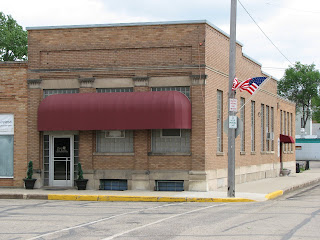
As I transition out of sabbatical and back to the parish, I am focusing on where we are going as a congregation, and the way we are planning to get there. This spring we completed a long range plan, which is built primarily around two concepts: Discipleship and Mission. This contrasts with what has tended to shape congregations the past few decades: Membership and Maintenance. (For example, see Michael Foss, Power Surge). The latter begins inside the church and stays there. Membership means I get certain benefits, and the task of the congregation is to maintain and improve those benefits. The former looks inward toward a deepening spirituality, but then goes outwards as one follows Christ in a life of discipleship geared to mission in the world.
Perhaps no one has written more profoundly about the call to discipleship than Dietrich Bonhoeffer, the German Lutheran theologian and pastor who, because he believed following Jesus meant opposing Hitler, lost his life in 1945 in a German concentration camp at the age of 39.
In his book, The Cost of Discipleship, Bonhoeffer distinguishes between what he calls “cheap grace” and “costly grace.” Cheap grace is “the justification of sin without the justification of the repentant sinner who departs from sin. . . . . Cheap grace is grace without discipleship, grace without the cross, grace without Jesus Christ, living and incarnate.” [p. 36]
In contrast, of “costly grace” he writes: “Happy are they who, knowing that grace, can live in the world without being of it, who, by following Jesus Christ, are so assured of their heavenly citizenship that they are truly free to live their lives in this world. Happy are they who know that discipleship simply means the life which springs from grace, and that grace simply means discipleship.” [p. 47]
Bonhoeffer then goes on to talk of the relationship of faith and belief to following and discipleship. He writes, in reference to Jesus calling Matthew in Mark 2:14:
“The call goes forth, and is at once followed by the response of obedience. The response of the disciples is an act of obedience, not a confession of faith in Jesus.” [p. 48] Faith and obedience must always be kept together. “Only the obedient believe. Without this preliminary step of obedience, our faith will only be pious humbug, and lead us to the grace which is not costly. Everything depends on the first step. . . . . . Only this new existence, created through obedience, can make faith possible.” [P. 55]
Years ago I read a fascinating article by Earnest T. Campbell, former Senior Minister at Riverside Church in New York City, entitled “Do You Believe in Christ or Are You Following Jesus?” He points out that over the decades of his life in the church he had often been asked if be believed in Christ, but never if he was following Jesus. At the end of the article he states that the two do need to be kept together, but that it is possible to believe without following, but not possible to follow without believing.
This is the theological goal of the Discipleship University that I am in the process of creating for Shepherd of the Valley. This university will include both study and action as we attempt to hold faith and following together, but move the stress toward what it means to be a disciple in the world today as that dimension has often been neglected. Stressing discipleship will not only greatly enrich our lives and strengthen our faith, but it will lead to a life-giving mission to the world and our communities sorely needed. Once again ethics will become paramount as we precede action by first asking what God is calling us to do.






